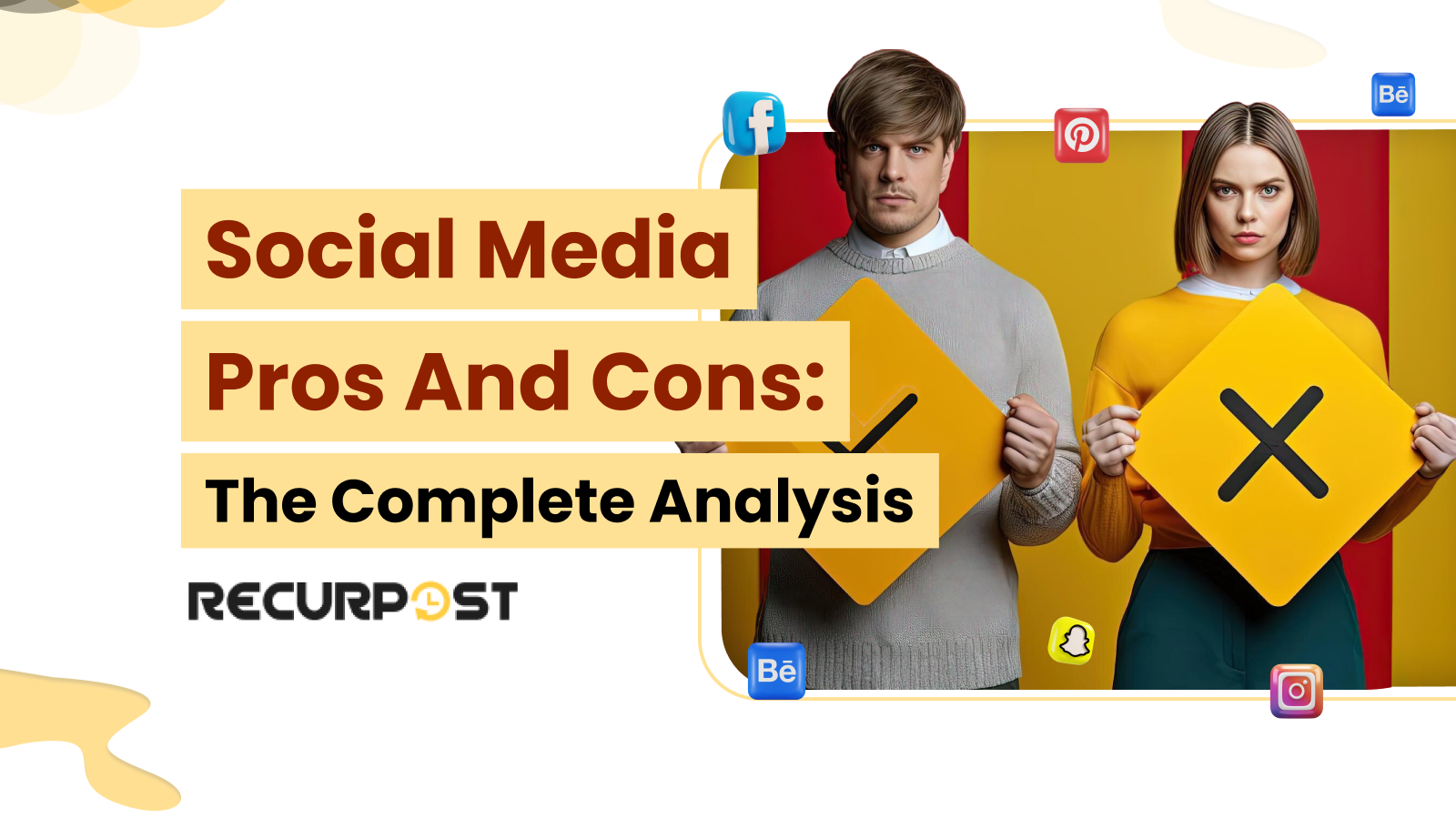Social media—double-edged sword or game-changer? You’ve probably thought about it before. On the one hand, it brings us together, energizes businesses, and provides unlimited entertainment. On the other, social media presents the cause of misinformation, stress, and security concerns.
The truth? It depends on how you use it. Whether you’re an individual, a business, or a marketer, social media can be a powerful tool—or a major distraction. Weighing the advantages and disadvantages of each platform helps you determine which ones align with your specific goals.
Let’s go through the pros and cons of social media for business, with a special focus on digital marketing and social media marketing capabilities to advance your business and on how algorithms shape your experience.
Growing Influence of Social Media on Businesses
Social media basics aren’t just about scrolling through memes or staying in touch with friends—it has completely changed how businesses operate. Whether you’re a small business owner or managing a global brand, social media is now a core part of business strategy.
Statistics to keep in mind:
Over 5.07 billion people use social media worldwide and have social media accounts, and the number keeps growing
Around 85% of brands use social media to increase awareness and engage with their target audience
75% of marketers say social media has been effective for their business growth
Social media introduced a revolution to the business marketplace. Prior to that, businesses barely had any effective ways of communicating with their buyers, mostly limited to emails, phone calls, or in-store visits.
Social media altered everything, empowering you to post a tweet, update a post, or respond to a comment in a second. Direct engagement with their buyers creates stronger connections and increases the level of trust.
Different industries experience varied impacts from social media:
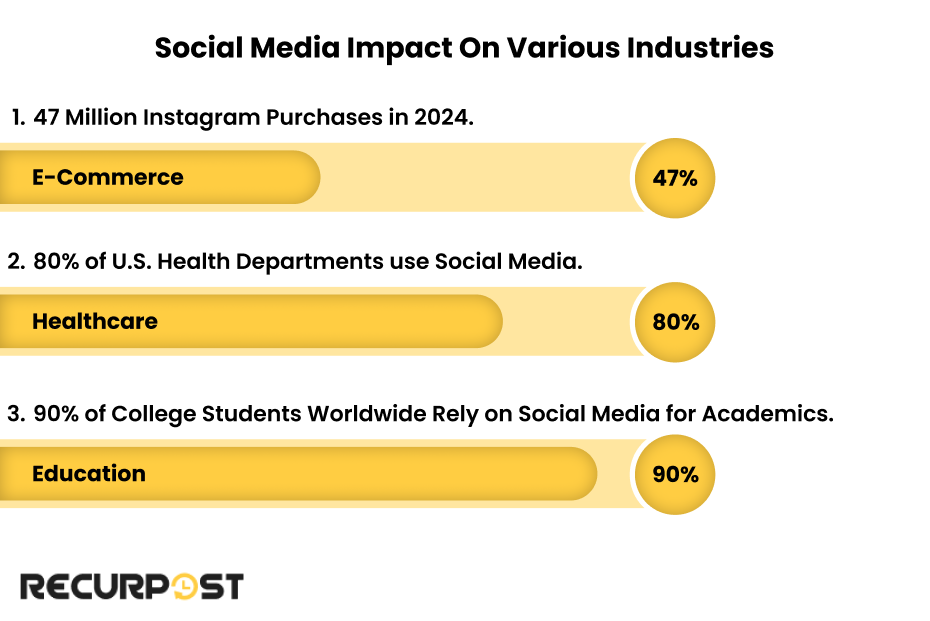
E-commerce: Facebook and Instagram offer shopping features, enabling consumers to shop from social media. This smooth shopping experience has revolutionized online retail, with nearly 47 million people in the U.S. expected to purchase through Instagram in 2024.
Healthcare: Social media is used by healthcare professionals and hospitals to post health information, engage with patients, and promote health programs. The NIH states that 80% of cancer patients who use social media use it to communicate with others with the same illnesses. For health organizations, more than 80% of U.S. state health departments are on social media.
Education: institutions utilize social media to communicate with students, post learning materials, and foster community. For instance, during the COVID-19 pandemic, schools utilized social media platforms like Facebook and YouTube to continue providing lessons and updates to students and parents. Also, it has been observed that 90% of college students globally use social media as an academic resource.
Key Benefits of Social Media
Social media allows you to reach out to individuals from all over the world in an instant. For example, LinkedIn connects over 900 million professionals, opening doors to new businesses, partnerships, and job opportunities.
Social media provides you with a platform to express your ideas and creativity. Ryan Kaji, 10 years old, turned his YouTube channel into a global brand, showing how social media can turn a hobby into a business.
You can access free learning material on YouTube and LinkedIn. According to a recent report by HubSpot, 62% of Gen Z use YouTube for learning, which allows you to enhance your skills at any moment.
Social media is a strong tool for staying updated and supporting a cause. According to research, 64% of individuals use it to keep themselves updated on what is going on around them, making it extremely important for political action.
Social media assists businesses in expanding by expanding the brand and engaging customers. Approximately 96% of small business owners use it to promote their businesses, showing that it’s necessary to find leads and reach more customers.
Niche communities flourish on social media. For instance, Reddit has 430 million active users on different subreddits, which allows individuals to connect with others with the same knowledge and interests.
Related: Discover essential concepts and enhance your social media learning!
Key Drawbacks of Social Media
Social media constant comparison can negatively impact mental health. You’re often exposed to curated highlights, which may cause unrealistic expectations and self-doubt.
Cyberbullying is a serious problem. According to a 2023 report by the Cyberbullying Research Center, 37% of students between 12-17 years old are victims of cyberbullying and online harassment, which is a reason for protection.
Misinformation rapidly spread on social media. You must always verify sources before sharing information since fake news can damage people and communities.
Social media addiction is detrimental to productivity and mental well-being. Spending too much time on social media can disrupt your work-life balance, and have an effect on personal and professional lives and thinking capacity, resulting in burnout.
The algorithms push content that you want to believe, making you an ‘echo chamber.’ Social media sites are designed to present you with more of what you already wish to believe, and this can foster prejudice and polarize views.
Social media has opened doors for businesses, but does it always work in their favor? Let’s explore the pros and cons.
Explore: Top 100 social networking sites!
Pros of Social Media Marketing for Business
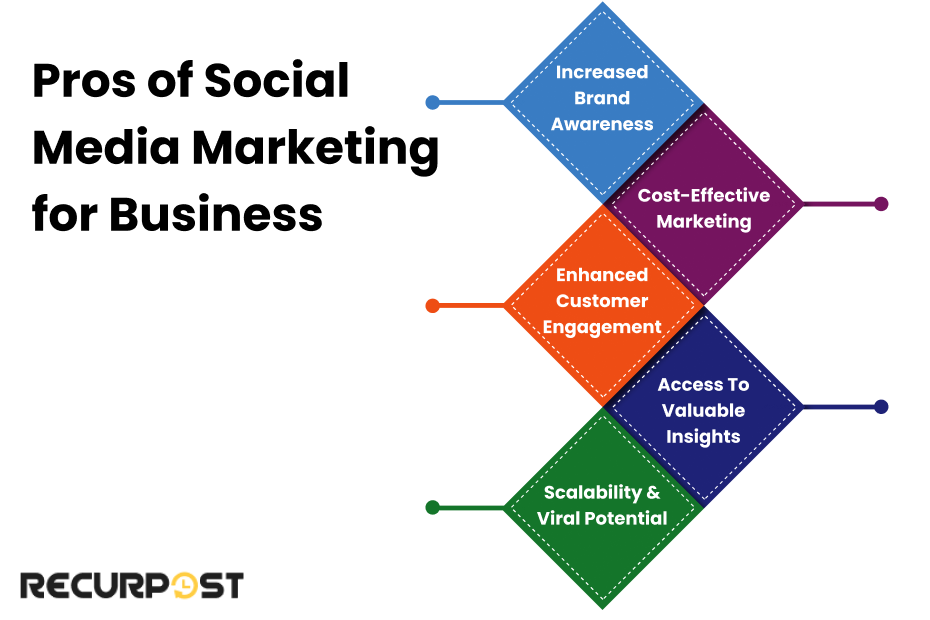
Increased Brand Awareness
Social media platforms can help you expand your reach with minimal investment. You can connect with millions of people globally, whether through Instagram, Twitter, or Facebook.
In fact, over 5.07 billion people use social media worldwide, giving you access to a vast audience. Take Spotify, for instance—they have effectively used social media to boost their brand awareness, reaching millions of new users with each new playlist or feature launch.
Cost-Effective Marketing
Compared to traditional forms of advertising like TV, radio, or print, social media marketing is far more affordable. For a fraction of the cost, you can run highly targeted ads, reaching the exact demographics that fit your customer profile.
Facebook ads, for example, allow you to set your budget and target users based on location, age, interests, and behaviors. The result? You get more bang for your buck without blowing your marketing budget.
Enhanced Customer Engagement
One of the major benefits of social media is the ability to interact directly with your customers. Unlike traditional advertising where communication is one-sided, social media allows you to engage with your audience in real time.
In fact, a survey found that 64% of consumers expect companies to engage with them on social media, which shows just how critical this interaction is for maintaining customer satisfaction.
Access to Valuable Insights
Social media platforms provide powerful analytics tools that give you a deep understanding of your audience’s behavior. Tools like Facebook Insights or Instagram Analytics allow you to track engagement rates, see which posts are performing best, and monitor audience demographics.
This data helps you make smarter decisions, adjust your strategy, and create content that resonates with your followers. For example, if you notice your audience responds well to behind-the-scenes content, you can incorporate more of that into your strategy.
Scalability & Viral Potential
Social media gives small businesses the chance to grow rapidly. A well-executed social media campaign has the potential to go viral, boosting your brand’s exposure overnight.
A good example is the ALS Ice Bucket Challenge, which went viral on Facebook in 2014, raising over $115 million for ALS research. This demonstrates how one clever idea can spread like wildfire and result in massive brand recognition—and even better, social media makes it possible for any business, big or small, to tap into that viral potential.
Real-World Success Stories
Several businesses have achieved incredible success through social media marketing, leveraging marketing terms to optimize their strategies and prove just how effective these platforms can be.
Glossier, the beauty brand, used Instagram to grow from a small startup to a $1.2 billion company in just a few years. As of 2019, the brand raised $100 million in Series D funding. They engaged directly with their customers by reposting user-generated content and listening to their community’s needs, which drove brand loyalty.
Dollar Shave Club created a viral marketing campaign with a hilarious, shareable video that reached millions of viewers. This video led to a surge in subscriptions and helped the company be acquired by Unilever for $1 billion in 2016.
These examples show how businesses have leveraged social media to amplify their reach, engage with their audience, and grow rapidly.
Cons of Social Media for Business
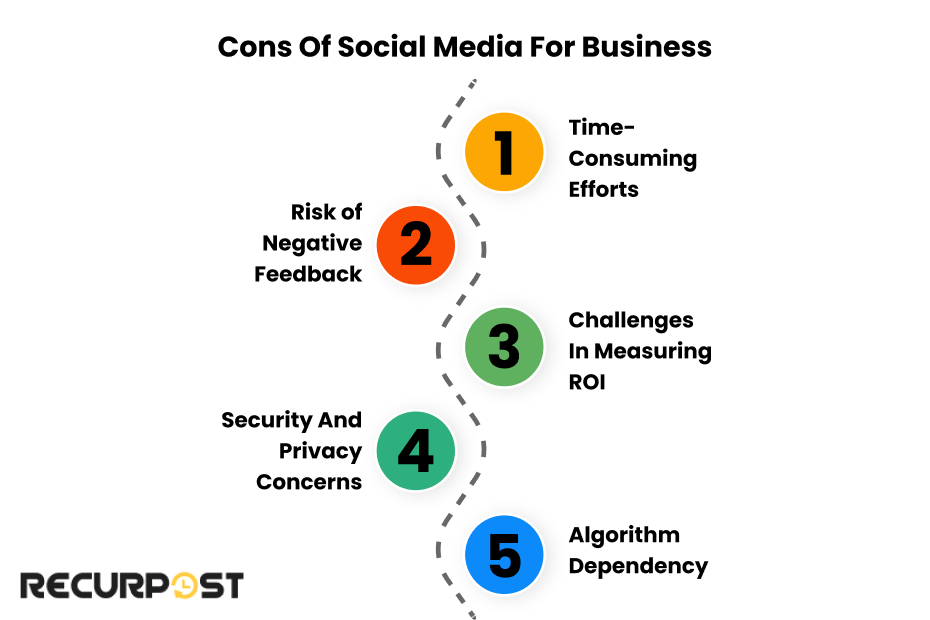
Time-Consuming Efforts
Running an active social media presence requires a serious time commitment. You need to constantly create, schedule, and engage with content across multiple platforms. It can feel like a full-time job, and if you’re a small business owner, it might take time away from other important tasks.
As per the recent survey, 61% of marketers struggle with creating enough content, which shows how challenging it can be to maintain consistent engagement.
Risk of Negative Feedback
While social media allows for direct engagement with customers, it also opens the door for negative feedback. Complaints, bad reviews, or public criticisms can easily damage your brand’s reputation if not addressed quickly and properly.
A negative tweet or Facebook post can go viral and damage your brand image. For example, in 2017, United Airlines faced a PR nightmare when a passenger was forcibly removed from a flight, and the incident spread across social media like wildfire.
Challenges in Measuring ROI
Measuring the return on investment (ROI) for social media marketing can be tricky. It’s hard to directly link social media activity to sales, especially if you’re building brand awareness or fostering customer loyalty rather than running direct-response ads.
While social media analytics tools like Google Analytics can provide some insights, it can be difficult to accurately track how social media directly impacts your bottom line.
Security and Privacy Concerns
Social media platforms store a lot of personal data, which can become a target for hackers. Data breaches and privacy concerns are a real issue for businesses, especially as customers become more aware of how their information is being used.
A 2024 study by the Pew Research Center found that 89% of Americans are concerned about how social media platforms handle their personal data, highlighting the growing privacy risks.
Algorithm Dependency
Social media platforms constantly change their algorithms, and these shifts can have a significant impact on your brand’s visibility. For example, Facebook’s algorithm changes have been known to reduce organic reach, forcing businesses to pay for ads in order to maintain the same level of engagement.
If your business is heavily reliant on organic reach, sudden algorithm changes can be a challenge, leaving you scrambling to adapt to new rules.
Common Pitfalls to Avoid in Social Media Marketing
1. Ignoring Audience Feedback
Your audience expects you to engage. Not addressing complaints or responding too late can harm your reputation. 60% of consumers expect a response within an hour, so timely engagement is essential. Take the time to listen, especially to negative comments, to show your customers that you care.
2. Over-promotion & Lack of Engagement
Constantly pushing sales without engaging your audience will turn them off. Followers want value and connection, not just “buy now” posts. 74% of consumers prefer brands that engage with them. Mix in informative or entertaining content to build trust and keep your audience interested.
3. Inconsistent Branding
Switching up your tone or style across platforms confuses your audience. Keep your messaging, design, and tone consistent, whether on Facebook, Instagram, or Twitter. A unified brand voice helps build trust and recognition, making your brand memorable.
4. Relying Solely on Paid Ads
Paid ads can boost visibility, but they can’t replace organic growth. Focus on building genuine connections and community engagement. Businesses that combine organic content and paid ads see the best results. Ads should complement, not dominate, your social strategy.
5. Underestimating Algorithm Changes
Social media algorithms constantly evolve, and failing to keep up can bury your content. For example, Instagram prioritizes engagement, so focus on content that sparks interaction. Stay updated on algorithm changes and adjust your strategy to maintain visibility and reach.
Pros and Cons of Social Media Algorithms
Pros
Personalized Content Delivery
Social media algorithms are designed to show your audience content that matches their interests. By tracking user behavior, platforms like Facebook and Instagram ensure that your posts are shown to the most relevant people. This helps you reach your ideal audience with more precision, which increases the likelihood of engagement.Increased Engagement Opportunities
Algorithms reward content that generates high engagement. When your posts get more likes, shares, and comments, they get pushed to a broader audience. This creates more opportunities for you to engage with social media users and build relationships. Relevant, engaging content can create a snowball effect, generating more visibility and interaction.Better Ad Targeting
One of the biggest advantages of social media algorithms is their ability to precisely target your ads. Platforms collect detailed data about user behaviors, preferences, and demographics, allowing you to tailor your campaigns to a specific audience. This ensures that your advertising dollars are spent more effectively.
Cons
Reduced Organic Reach
Social media algorithms often limit the organic reach of your content. As platforms prioritize paid ads and content with high engagement, your posts may not reach as many people unless they’re paid for. This has made organic growth harder, forcing businesses to rethink their strategy and invest more in ads or engaging content.Dependence on Platform Changes
With algorithms constantly being updated, it’s hard to predict how changes will affect your visibility. What worked yesterday might not work today. This unpredictability can leave businesses scrambling to adjust their strategies, which can be frustrating if you’re relying heavily on one platform for visibility.Content Saturation
With so much content being posted every day, it’s easy for your posts to get lost in the noise. Social media platforms are saturated with ads, posts, and stories, making it harder to stand out. To combat this, you need to create content that not only catches attention but also sparks engagement.
Understanding Algorithm Challenges:
- Adapting to Algorithm Changes
Stay on top of algorithm changes by regularly reviewing platform updates and adjusting your content accordingly. Follow industry blogs, attend webinars, and engage with other businesses to keep your strategy current.
- Balancing Organic and Paid Strategies
While organic content is essential, paid ads can give you a boost when needed. Strive for a balance where you’re creating engaging content to grow your organic reach while using targeted ads to amplify high-performing posts.
- Leveraging Multiple Platforms
Don’t put all your eggs in one social media basket. Platforms like Facebook, Instagram, LinkedIn, and TikTok all have different algorithms, and diversifying your presence helps reduce your dependence on one platform. This ensures that if one platform’s algorithm changes, you can still maintain your reach on others.
Case Studies and Research Findings
Positive Effects of Social Media
MeToo and Black Lives Matter are indicators of how social media has been able to propel strong social movements. The #MeToo movement began with Alyssa Milano’s tweet in 2017, spread like wildfire on Twitter, and thousands of people, including celebrities, came out and shared their experiences of being sexually harassed. This gender equality and workplace misconduct debate took flight globally.
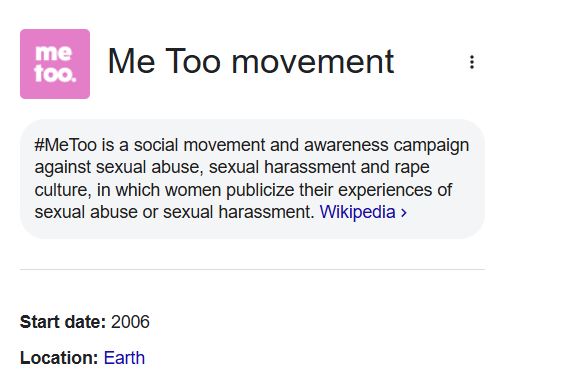
Similarly, #Black Lives Matter, initiated as a hashtag, became a global movement on Twitter and Instagram, resulting in protests, policy discussions, and increased consciousness of racial injustice.
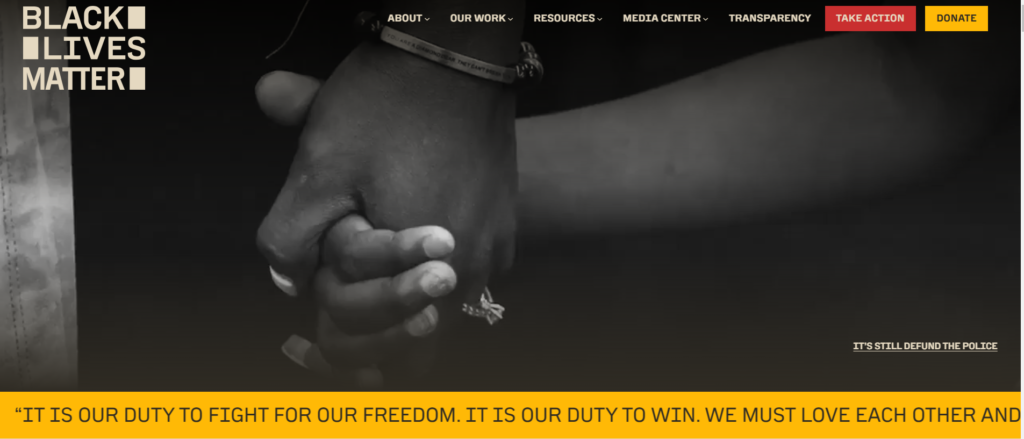
Social media has also been a source of support groups and online communities, particularly in the mental health space. For example, #MentalHealthAwareness on Twitter has brought together people experiencing mental health issues, enabling them to exchange personal stories and tips.
Facebook groups, such as The Anxiety and Depression Support Group, provide a support group atmosphere where people meet, exchange survival tips, and seek support.
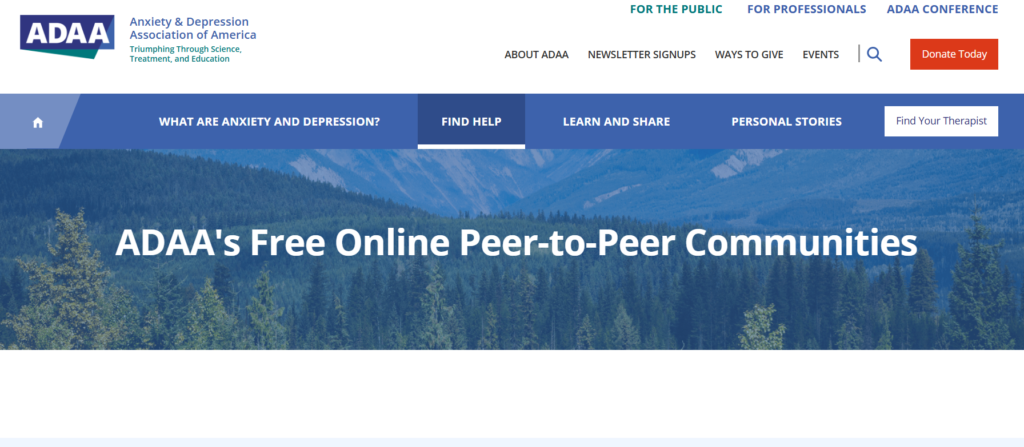
Negative Effects of Social Media
Social media usage has also been associated with mental illness, especially among adolescents. An American Psychological Association report concluded that heavy usage of social media is associated with increased loneliness, depression, and anxiety in teenagers.
Social media also creates psychological distress through curated online images. Individuals tend to compare themselves with idealized others they observe on social media, leading to feelings of inadequacy or low self-esteem.
Strategies for Responsible Social Media Use
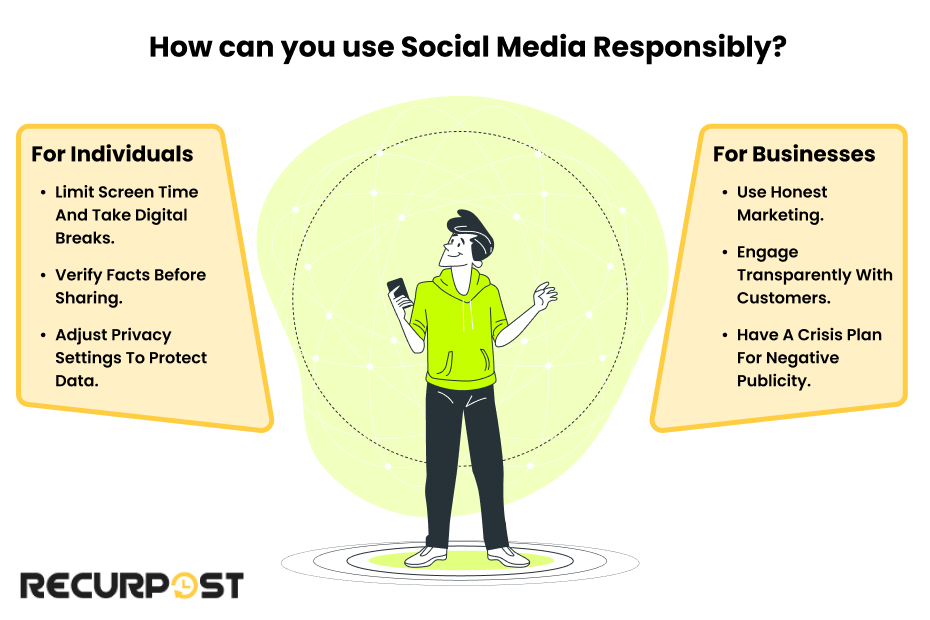
For Individuals
Set screen time limits and digital detox breaks: These routines disconnect you from the incessant stream of information and avert burnout.
Fact-check before sharing: Check information before sharing to avoid spreading disinformation.
Adjust privacy settings: Take control of personal data shared and stay private in an era of data breaches.
For Businesses
Ethical marketing: Avoid dishonest advertising or deceptions. Be honest and clear in communications.
Invite open engagement: Respond to customer questions, provide value, and establish trust through transparency.
Create crisis management plans: Bad publicity can happen. Prepare a plan to address it appropriately.
Striking the Right Balance in the Online Era!
Is social media good for society? While it brings powerful benefits like global connectivity and business growth, it also poses challenges that can impact society negatively. Understanding the pros and cons of social media marketing and social media collaboration helps businesses make informed decisions on how to leverage these platforms effectively.
Whether you’re a business using it for marketing or an individual seeking to stay informed, balance is extremely critical. Prioritize meaningful discussions, verify facts before posting, and set boundaries to avoid overuse.
To navigate the social media marketing benefits and risks, use RecurPost to manage social media platforms for your business hassle-free. Schedule posts, automate engagement, and stay consistent without wasting hours online. Focus on strategy while RecurPost ensures your content reaches the right audience at the right time while minimizing the disadvantages of social media marketing.
Make social media work for you, not control you. Stay connected, but engage wisely and responsibly!
Frequently Asked Questions
1. Is social media contributing to shorter attention spans?
Yes, this is one of the social media cons that users should be mindful of. Constant scrolling and quick content formats train your brain to crave instant gratification, making it harder to focus on longer tasks. Studies suggest heavy social media use is linked to reduced attention spans and difficulty with deep work.
2. How does social media impact real-life relationships?
While there are many pros about social media, such as staying connected with loved ones, it can also create distance when online interactions replace real-life conversations. Studies show excessive use can lead to reduced face-to-face communication and feelings of loneliness.
3. What are the risks of deepfake technology and AI-generated content on social media?
Deepfakes can spread misinformation, manipulate opinions, and damage reputations. With AI-generated content becoming more realistic, it’s harder to distinguish real from fake, making fact-checking essential before believing or sharing anything online.
4. Can quitting social media improve mental health?
Reducing or quitting social media can lower anxiety, improve focus, and boost self-esteem. Research shows people who take breaks from social media often report feeling less stressed and more engaged in real-world activities.
5. How do social media platforms make money if they are free to use?
Social media platforms generate revenue primarily through targeted advertising. They collect user data to serve personalized ads, partner with businesses for promotions, and monetize premium features or subscriptions.
6. What are shadow banning and content suppression, and how do they affect users?
Shadow banning occurs when platforms limit a user’s content visibility without notifying them. This can reduce engagement and reach, often due to algorithm changes or policy violations, affecting creators and businesses relying on organic growth.
7. What are the pros and cons of social media advertising?
Social media ads help you reach a targeted audience, boost brand awareness, and track real-time results. However, they come with challenges like ad fatigue, algorithm changes, and high competition. To get the best results, you’ll need to constantly optimize your campaigns and stay updated with platform trends

Shalini Nagar is an experienced content writer with a proven track record of creating diverse and engaging content across various formats. With years of expertise in crafting blogs, articles, she excels at delivering compelling narratives tailored to different audiences.
